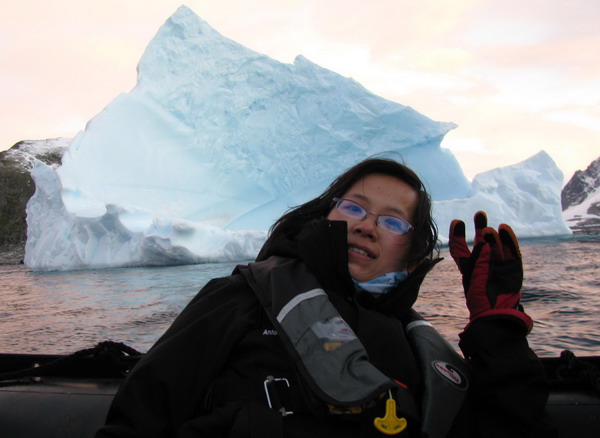Cold climate sparks warm view
Updated: 2010-11-26 07:53
By Sun Li (China Daily)
|
|||||||||||
|
 Li Lina discovered a new perspective on the world during an expedition to the Antarctic last year. [Photo/provided to China Daily] |
Antarctic trip inspires activist to devote herself to environment
BEIJING - It was in one of the most desolate places where Li Lina discovered a new view of the world - immaculate floating ice in the Antarctic gleaming of purest azure, a fleecy snow blanket molding the wildness into a smooth glaring white and waddling penguins that looked like tap dancers.
"It was the first time I'd seen and been overwhelmed by such superlative beauty of nature," said Li, who finished her postgraduate studies at Peking University early this year.
Now she feels disconsolate every time she thinks the changing climate will accelerate the melting of glaciers and destroy such a place of purity.
Bearing the threatened Antarctic scenery in mind, Li developed a keen interest in climate change and joined YOUNGO, the youth constituency of the United Nations Framework Convention on Climate Change.
Last year she took part in the Copenhagen Climate Change Conference as a leading member of China's youth delegation, the first non-governmental Chinese youth team involved in United Nations' climate talks.
While most of the youth delegates returned to focus on their careers or further studies after the conference, Li, now a full-time employee with a Beijing-based Fortune 500 company, has spent all her spare time since July assembling a new team for Cancun, Mexico, the host city for this year's UN climate summit, which starts on Monday.
"Some former colleagues can't understand my mania about it," Li said.
"Few can go through the intense pressure one more time."
Li said that in Copenhagen they were preoccupied with studying the material at night for the next day's meetings, tracking down powerful players, following all the meetings and later sorting out information and blogging to inform outsiders of what was happening.
"The tight schedule left us drenched in sweat even in last year's bone-chilling winter," Li said. "Everyone was exhausted by lengthy negotiations."
In the past few months, Li has once again busied herself in her off hours preparing for the journey to the UN climate talks to enhance the team's performance.
According to Li, the last delegation had only one month to prepare before leaving for Copenhagen.
Lacking experience and preparation, many of the delegates felt lost in meetings replete with climate change terminology.
This year, China's youth delegation has enough time "to do its homework".
"Our mission is to serve as a bridge, channeling more young people to the event by collecting their ideas and questions via the Internet and asking those questions on their behalf in Mexico," Li said.
"We will not just make a presence. We are going to collaborate with youth delegations from all over the world and prove young people can make a difference in UN climate change talks."
Li has long been interested in participating in international activities.
Majoring in international politics at the university, Li has joined many international events and organizations, including AIESEC, the world's largest student-run group that develops leadership capabilities.
At the end of 2008, she noticed the Leadership on the Edge program designed to build participants' leadership skills and environment protection awareness while exploring Antarctica.
Given Li's rich experiences in international activities, she was selected to go by Robert Swan, the initiator of the program and the first person to have visited both the North and South poles.
"Everything on the Antarctic continent was pretty amazing, and amazingly pretty," Li said.
Li remembered Swan telling her how his eyes were once affected and the skin peeled off his face after walking for weeks under the hole in the ozone layer.
But Li said she was very impressed by Swan and his colleagues' effort to build the first education station in Antarctica powered entirely by renewable energy.
"From that, I've come to see that one can make great contributions to the environment through individual effort and one's actions can really inspire, stimulate and uplift others," Li said.











